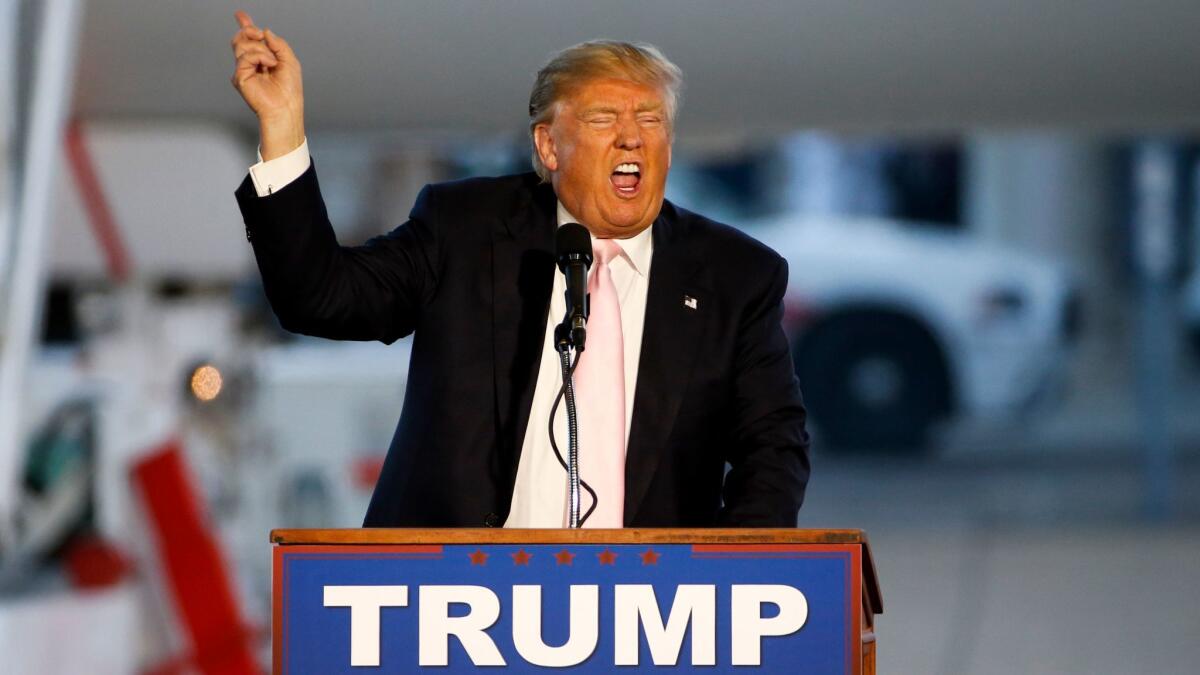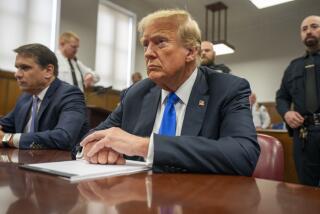Column: Conservatives shouldn’t trust Trump with their votes, or the Constitution

In the closing days of the presidential campaign, Donald Trump and other Republicans have warned that if Hillary Clinton wins, we’ll face a constitutional crisis – an immediate drive in Congress to impeach her. But if Trump wins, we could face a constitutional crisis, too – only one in which democratic norms would have fewer defenders.
So voters who consider themselves conservatives or libertarians should take one more chance to think their choice through; Trump is neither their friend nor their champion.
Over the course of the campaign, Trump has shown that he neither knows nor cares much about the Constitution. He has never spoken in any serious way about the virtues of limited government, the bedrock of conservative political thought. Instead, he has spoken about the virtues of strong government and listed a half-dozen ways he would be tempted to abuse the power of the White House.
Trump would use the presidency and federal agencies to pursue personal vendettas.
Here’s an easy one: executive orders. Many conservatives have condemned President Obama for exceeding his constitutional writ with sweeping orders on immigration and the environment. Not Trump. He’s praised Obama on that score.
“He’s led the way, to be honest with you,” the GOP nominee said. “But I’m going to use them much better.”
Even more worrisome, Trump would use the presidency and federal agencies to pursue personal vendettas. That’s not my fevered imagination talking; he has said so himself.
When the Ricketts family, owners of the Chicago Cubs, opposed him in the Republican primaries, Trump issued a gangland-style threat: “They better be careful, they have a lot to hide!”
When the Washington Post published articles Trump didn’t like, he threatened to retaliate against the paper’s owner, Amazon Chief Executive Jeff Bezos.
“Believe me, if I become president, oh, do they have problems,” he said, mentioning tax enforcement and antitrust regulation as potential cudgels.
When a federal judge ruled against him in a civil suit, Trump said the jurist ought to be investigated. “They ought to look into what Judge Curiel is doing, because what Judge Curiel is doing is a total disgrace,” he fumed.
When critics warned it would be illegal to order U.S. forces to kill the families of suspected terrorists, Trump scoffed. “They’re not going to refuse me,” he said. “If I say do it, they’re going to do it.”
And when it comes to Clinton, Trump not only pledged to name a special prosecutor, he promised that if he’s elected, she’ll be “in jail” — apparently skipping the inconveniences of investigation and trial.
Trump apologists sometimes claim this is merely campaign rhetoric, and that we shouldn’t take the Republican Party nominee literally. But Trump’s autocratic outbursts are in keeping with his long-held concept of power and how to use it. This is who he really is.
Take Trump’s admiration for foreign leaders such as Russia’s Vladimir Putin.
“I always felt fine about Putin,” Trump said. “I think that he’s a strong leader.”
When MSNBC’s Joe Scarborough, a former Republican congressman, objected that Putin’s regime has murdered journalists, Trump’s instinct, bizarrely, was to defend the Russians.
“Our country does plenty of killing, too,” he said.
Although Trump later insisted that he wasn’t endorsing Putin’s repression, he was still revealing something about his value system: Strength is always better than weakness. Opponents are there to be crushed. And restraint is not a virtue.
For such a man to control the FBI, the Justice Department and the Internal Revenue Service is simply frightening. That’s why serious conservatives such as Mitt Romney and Sen. Ben Sasse (R-Neb.) have said they could never support him.
“Much like President Obama, he displays essentially no understanding of the fact that, in the American system, we have a constitutional system of checks and balances,” Sasse wrote in a letter to constituents.
“He’s not … the kind of stable, thoughtful person we need as a leader,” Romney said earlier this year. “This is the very brand of anger that has led other nations into the abyss.”
Some Trump supporters claim he’ll change once he’s in office, or that wise advisors will smooth his rough edges. But they made that claim during the campaign, too – and Trump’s promised “pivot” never happened.
Others pray that Congress will rein him in — that Paul Ryan and Mitch McConnell will provide the checks and balances the Constitution designed.But if a Trump victory produces a GOP majority in the Senate, grass-roots Republicans will want Congress to fall in line behind their new president, not block his path.
If Clinton wins, by contrast, she’ll almost certainly face a hostile GOP majority in the House. That won’t only be a check to any legislation she proposes; it virtually guarantees an early debate over possible impeachment proceedings.
A President Trump would face no such countervailing power. A Trump victory would mean one-party government under a party remade in its leader’s image: a GOP House, a GOP Senate and, within a year, a conservative-majority Supreme Court.
Trump would be able to abuse his power with impunity — and, based on his own statements and his track record, he would feel little restraint in doing so.
That’s why conservatives shouldn’t trust him with their votes — or the Constitution.
Twitter: @doylemcmanus
Follow the Opinion section on Twitter @latimesopinion and Facebook
More to Read
A cure for the common opinion
Get thought-provoking perspectives with our weekly newsletter.
You may occasionally receive promotional content from the Los Angeles Times.











